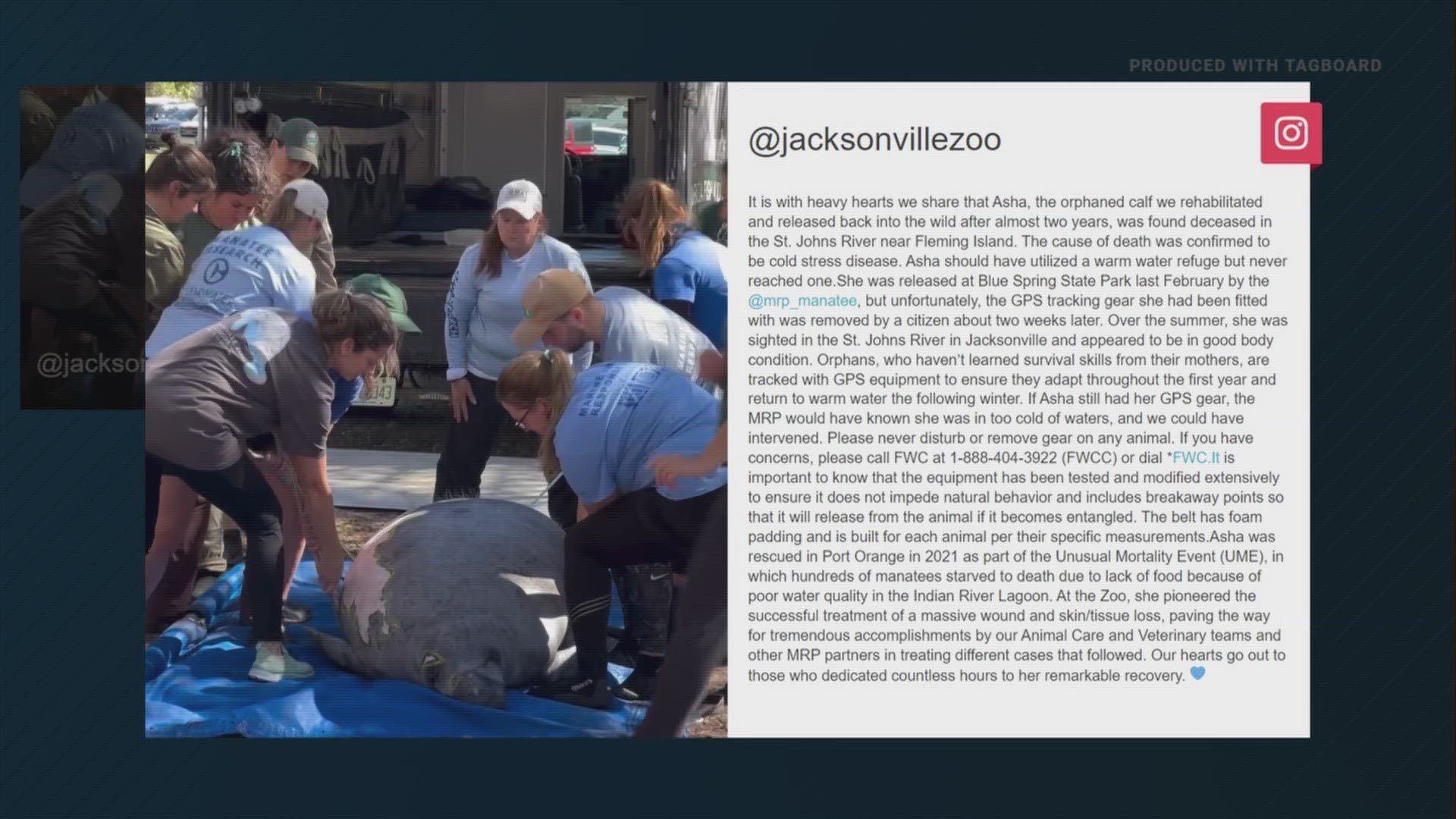Nurtured by the Jacksonville Zoo & Gardens as an orphaned calf, Asha was found dead in the St. Johns River near Fleming Island.
JACKSONVILLE, Fla. — Asha, an orphaned calf the Jacksonville Zoo & Gardens rehabilitated and released back into the wild after almost two years, has died, according to a social media post from the organization.
The cause of death was confirmed to be cold stress disease after failing warm water refuge, the zoo said.
The manatee was released at Blue Spring State Park last February, but the GPS tracking gear she had been fitted with was removed by a citizen about two weeks later. Orphan calves who haven’t learned survival skills from their mothers are tracked with GPS equipment to ensure they adapt throughout the first year and return to warm water the following winter.
If Asha still had her GPS gear, the Zoo said, agencies would have known she was in cold waters and could have intervened. If you have concerns, please call FWC at 1-888-404-3922 or dial *FWC.
It is important to know that the equipment has been tested and modified extensively to ensure it does not impede natural behavior and includes breakaway points so that it will release from the animal if it becomes entangled. The belt has foam padding and is built for each animal per their specific measurements.
Asha was rescued in Port Orange in 2021 as part of the Unusual Mortality Event, in which hundreds of manatees starved to death due to lack of food because of poor water quality in the Indian River Lagoon. Asha recovered remarkably at the Zoo, receiving treatment of a massive wound and skin/tissue loss.
Asha was seen in the St. Johns River in Jacksonville and appeared to be in good body condition, the post said.
It is with heavy hearts we share that Asha, the orphaned calf we rehabilitated and released back into the wild after almost two years, was found deceased in the St. Johns River near Fleming Island. The cause of death was confirmed to be cold stress disease. Asha should have utilized a warm water refuge but never reached one.
She was released at Blue Spring State Park last February by the @mrp_manatee, but unfortunately, the GPS tracking gear she had been fitted with was removed by a citizen about two weeks later. Over the summer, she was sighted in the St. Johns River in Jacksonville and appeared to be in good body condition.
Orphans, who haven’t learned survival skills from their mothers, are tracked with GPS equipment to ensure they adapt throughout the first year and return to warm water the following winter. If Asha still had her GPS gear, the MRP would have known she was in too cold of waters, and we could have intervened. Please never disturb or remove gear on any animal. If you have concerns, please call FWC at 1-888-404-3922 (FWCC) or dial *FWC.
It is important to know that the equipment has been tested and modified extensively to ensure it does not impede natural behavior and includes breakaway points so that it will release from the animal if it becomes entangled. The belt has foam padding and is built for each animal per their specific measurements.
Asha was rescued in Port Orange in 2021 as part of the Unusual Mortality Event (UME), in which hundreds of manatees starved to death due to lack of food because of poor water quality in the Indian River Lagoon. At the Zoo, she pioneered the successful treatment of a massive wound and skin/tissue loss, paving the way for tremendous accomplishments by our Animal Care and Veterinary teams and other MRP partners in treating different cases that followed. Our hearts go out to those who dedicated countless hours to her remarkable recovery. 💙
Posted by Jacksonville Zoo and Gardens on Friday, January 12, 2024

